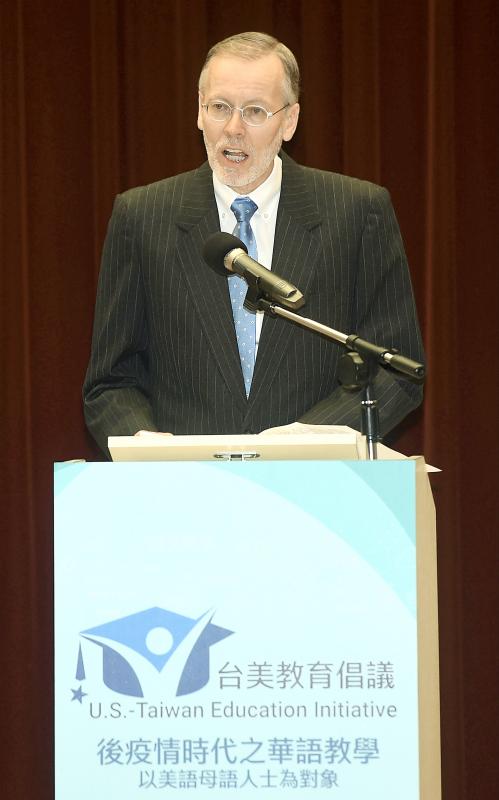With the closure of China’s Confucius Institutes in the US, it is time for Taiwan to fill the Mandarin teaching gap and share “a different version of history” with US students, American Institute in Taiwan (AIT) Director Brent Christensen told the Chinese Language Symposium to Support the US-Taiwan Education Initiative in Taipei yesterday.
“We have all read news stories about the closing of many of the PRC’s [People’s Republic of China] Confucius Institutes in the US. Now is the time for Taiwan to step forward and help fill this gap — not only to teach Mandarin and learn English, but to more fully tell Taiwan’s story to their American students,” Christensen said in Mandarin.
The US Department of State in August last year designated the Confucius Institute US Center as a Chinese “foreign mission” for multifaceted propaganda efforts.

Photo: Chien Jung-fong, Taipei Times
After Taiwan and the US last month signed a memorandum of understanding on international education cooperation, both sides have agreed to expand existing programs, including the Fulbright Foreign Language Teaching Assistant Program, Christensen said.
Wishing good luck to about 60 program participants who are to teach Mandarin in the US, he told them they play a crucial role in teaching young Americans a language spoken by 1.3 billion native speakers around the world and have the opportunity to tell a different version of history than the one taught at Confucius Institutes.
‘CIVIC AMBASSADORS’
Encouraging Taiwanese instructors to serve as “civic ambassadors” and make more friends, National Security Council (NSC) Deputy Secretary-General Hsu Szu-chien (徐斯儉) said the government attaches great importance to the program, and the council since May last year has been coordinating inter-agency efforts to make plans to promote Mandarin teaching in the US and Europe.
Many senior US researchers on Chinese affairs had learned Mandarin in Taiwan during or after China’s Cultural Revolution, Department of North American Affairs Director-General Douglas Hsu (徐佑典) said, but added that when Taipei stopped funding the Stanford Center at National Taiwan University and China opened up to the world late last century, many Americans turned to China to learn the language, which resulted in their alienation from Taiwan’s views when addressing cross-strait issues.
As many prestigious universities in the US, including military academies, are establishing Mandarin-teaching departments, Taiwan should take the opportunity to tout its teaching resources online and offline, he added.
In the US, the number of K-12 students learning Mandarin exceeded 400,000 in 2017, doubling from only two years earlier, AIT Deputy Director Raymond Greene said.
US students traditionally chose Spanish as their second language, but more have been opting for Mandarin, he said.
Over the past few years, students and academics have avoided going to China, first due to environmental and then political concerns, as Beijing imposes more totalitarian restrictions on Internet use and the freedom of speech, he said.
Asked if the trend might shift back to Beijing if US-China relations improve, Greene said it is a natural shift for such people to come to Taiwan, adding that the trend would only continue to grow.

Conflict with Taiwan could leave China with “massive economic disruption, catastrophic military losses, significant social unrest, and devastating sanctions,” a US think tank said in a report released on Monday. The German Marshall Fund released a report titled If China Attacks Taiwan: The Consequences for China of “Minor Conflict” and “Major War” Scenarios. The report details the “massive” economic, military, social and international costs to China in the event of a minor conflict or major war with Taiwan, estimating that the Chinese People’s Liberation Army (PLA) could sustain losses of more than half of its active-duty ground forces, including 100,000 troops. Understanding Chinese

The Ministry of Foreign Affairs (MOFA) yesterday said it is closely monitoring developments in Venezuela, and would continue to cooperate with democratic allies and work together for regional and global security, stability, and prosperity. The remarks came after the US on Saturday launched a series of airstrikes in Venezuela and kidnapped Venezuelan President Nicolas Maduro, who was later flown to New York along with his wife. The pair face US charges related to drug trafficking and alleged cooperation with gangs designated as terrorist organizations. Maduro has denied the allegations. The ministry said that it is closely monitoring the political and economic situation

UNRELENTING: China attempted cyberattacks on Taiwan’s critical infrastructure 2.63 million times per day last year, up from 1.23 million in 2023, the NSB said China’s cyberarmy has long engaged in cyberattacks against Taiwan’s critical infrastructure, employing diverse and evolving tactics, the National Security Bureau (NSB) said yesterday, adding that cyberattacks on critical energy infrastructure last year increased 10-fold compared with the previous year. The NSB yesterday released a report titled Analysis on China’s Cyber Threats to Taiwan’s Critical Infrastructure in 2025, outlining the number of cyberattacks, major tactics and hacker groups. Taiwan’s national intelligence community identified a large number of cybersecurity incidents last year, the bureau said in a statement. China’s cyberarmy last year launched an average of 2.63 million intrusion attempts per day targeting Taiwan’s critical

‘SLICING METHOD’: In the event of a blockade, the China Coast Guard would intercept Taiwanese ships while its navy would seek to deter foreign intervention China’s military drills around Taiwan this week signaled potential strategies to cut the nation off from energy supplies and foreign military assistance, a US think tank report said. The Chinese People’s Liberation Army (PLA) conducted what it called “Justice Mission 2025” exercises from Monday to Tuesday in five maritime zones and airspace around Taiwan, calling them a warning to “Taiwanese independence” forces. In a report released on Wednesday, the Institute for the Study of War said the exercises effectively simulated blocking shipping routes to major port cities, including Kaohsiung, Keelung and Hualien. Taiwan would be highly vulnerable under such a blockade, because it